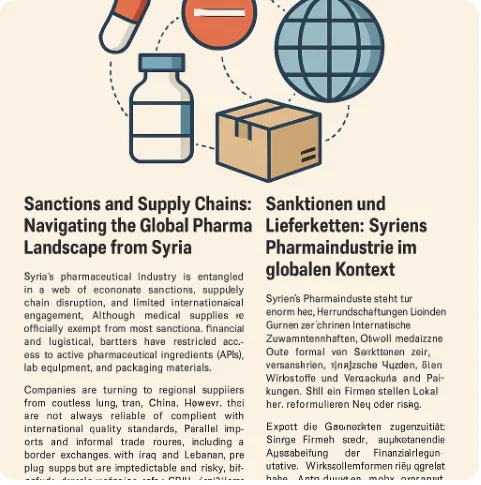
Pharmaceutical Workforce in Syria: Talent, Training, and the Path Forward
Pharmaceutical Workforce in Syria: Talent, Training, and the Path Forward
(English Version)

The Syrian pharmaceutical sector’s recovery is not just about rebuilding factories—it also hinges on its human capital. The war led to a significant exodus of pharmacists, chemists, and technicians. Today, rebuilding the talent pipeline is as critical as restoring infrastructure.
Many pharmacy schools remained operational throughout the conflict, albeit with reduced capacity and outdated curricula. Graduates face challenges entering a disrupted job market and gaining modern skills in GMP, QA/QC, or international regulatory compliance.
To address this, some NGOs and universities have launched training initiatives, offering short courses and online programs to upskill local professionals. Moreover, Syrian professionals in the diaspora are beginning to contribute by mentoring, investing, or sharing expertise remotely.
Women now make up a growing share of the workforce, stepping into roles previously dominated by men. This demographic shift could redefine the future of pharmaceutical leadership in Syria.
Sustained investment in education, public-private partnerships, and access to global learning platforms will be essential to build a workforce that supports quality, innovation, and industry revival.
Pharma-Fachkräfte in Syrien: Talente, Ausbildung und der Weg nach vorn
(Deutsche Version)
Die Erholung der syrischen Pharmaindustrie betrifft nicht nur zerstörte Produktionsstätten – der Schlüssel liegt auch im Fachpersonal. Der Krieg führte zur Abwanderung vieler Apotheker, Chemiker und Techniker. Heute ist der Wiederaufbau der Fachkräfte ebenso entscheidend wie der der Infrastruktur.
Trotz des Krieges blieben viele Pharmazie-Fakultäten geöffnet, wenn auch mit eingeschränktem Betrieb und veralteten Lehrplänen. Absolventen stoßen auf einen Arbeitsmarkt mit begrenzten Chancen und fehlenden modernen Qualifikationen, z. B. in GMP, Qualitätskontrolle oder regulatorischen Standards.
Einige NGOs und Universitäten bieten mittlerweile Weiterbildungen und Onlinekurse an, um diese Lücken zu schließen. Auch syrische Fachkräfte im Ausland engagieren sich durch Mentoring, Kapital oder Know-how-Transfer.
Auffällig ist der wachsende Anteil von Frauen in der Branche – ein struktureller Wandel mit Potenzial für langfristige Führungsrollen im Gesundheitswesen.
Zukunftssicherung gelingt nur mit gezielter Förderung von Bildung, starken Partnerschaften und Zugang zu internationalem Wissen.